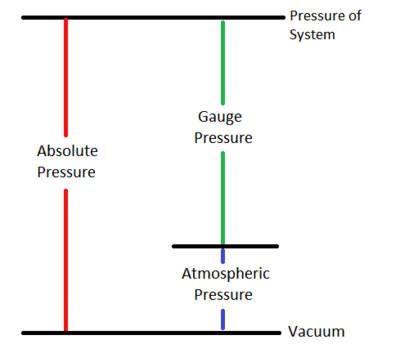Psig
Pounds per square in gauge, or psig, is a measure of pressure—but only a measurement of gauge pressure. This means that it is measured with respect to the atmospheric pressure.[1] The unit to measure psig is psi.
In contrast to psig, psia is pounds per square inch absolute and it measures the absolute pressure, which is gauge pressure plus atmospheric pressure. This means it is measured with respect to vacuum.
All of this can be visualized in Figure 1.
For example, a bike tire may be 65 psi above atmospheric pressure, which is its psig value, and if the atmospheric pressure is 14.7 psi, then its psia value would be 65 + 14.7 = 79.7 psia.

Figure 1: Possible pressure measurements of a system.[2]
For Further Reading
- Pressure
- Gauge pressure
- Absolute pressure
- Vacuum
- Psi
- Pounds per square inch
- Or explore a random page
References
- ↑ Measurement Unit Converter. (May 7, 2015). Psig [Online]. Available: http://www.convertunits.com/info/psig
- ↑ Created internally by a member of the Energy Education team.

